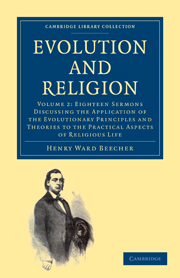Book contents
- Frontmatter
- Contents
- INTRODUCTORY: THE BACKGROUND OF MYSTERY
- I THE MANIFOLD CHRIST
- II THE CONVERSION OF FORCE
- III THE DRIFT OF THE AGES
- IV THE HIDDEN MAN
- V THE REST OF GOD
- VI GOD'S LOVING PROVIDENCE
- VII THE NEW TESTAMENT THEORY OF EVOLUTION
- VIII GOD'S GOODNESS MAN'S SALVATION
- IX POVERTY AND THE GOSPEL
- X GOD IN THE WORLD
- XI JESUS THE TRUE IDEAL
- XII THE GROWTH OF CREATION
- XIII THE BATTLE OF LIFE
- XIV THE LIBERTY OF CHRIST
- XV CONCORD, NOT UNISON
- XVI LIBERTY AND DUTY OF THE PULPIT
- XVII THE VITALITY OF GOD'S TRUTH
XIV - THE LIBERTY OF CHRIST
Published online by Cambridge University Press: 29 August 2010
- Frontmatter
- Contents
- INTRODUCTORY: THE BACKGROUND OF MYSTERY
- I THE MANIFOLD CHRIST
- II THE CONVERSION OF FORCE
- III THE DRIFT OF THE AGES
- IV THE HIDDEN MAN
- V THE REST OF GOD
- VI GOD'S LOVING PROVIDENCE
- VII THE NEW TESTAMENT THEORY OF EVOLUTION
- VIII GOD'S GOODNESS MAN'S SALVATION
- IX POVERTY AND THE GOSPEL
- X GOD IN THE WORLD
- XI JESUS THE TRUE IDEAL
- XII THE GROWTH OF CREATION
- XIII THE BATTLE OF LIFE
- XIV THE LIBERTY OF CHRIST
- XV CONCORD, NOT UNISON
- XVI LIBERTY AND DUTY OF THE PULPIT
- XVII THE VITALITY OF GOD'S TRUTH
Summary
“Stand fast therefore in the liberty where with Christ hath made us free, and be not entangled again with the yoke of bondage.”
“For, brethren, ye have been called unto liberty; only use not liberty for an occasion to the flesh, but by love serve one another.”
—Gal. v: 1, 13.The transition from Judaism to Christianity was not facile. It was not upon smooth water nor under a balmy sky. There was involved in it nearly every one of those elements of resistance and of contention which have accompanied growth from that day to this. As human life begins in throes and labor-pain, so every successive step of development in the individual is by the throes of self denial. It would seem almost as though suffering and sorrow were godmothers to every step upward in this world. No enfranchisement among men in citizenship, no liberty of men in moral things, no largeness in organization toward liberty, and no clearer light in matters of religious faith and religious duty have taken place, except through contentions, resistances—largely the resistance of good men; good in other things, not wise in that.
We are living in a time when we know that there is a great change going on. I do not allude to the long past tendencies in Germany, and the lapse of faith in France, but to the tendencies in our own mother land, in England, where, if there is a learned conservatism in the world, it abides.
- Type
- Chapter
- Information
- Evolution and Religion , pp. 366 - 382Publisher: Cambridge University PressPrint publication year: 2009First published in: 1885

